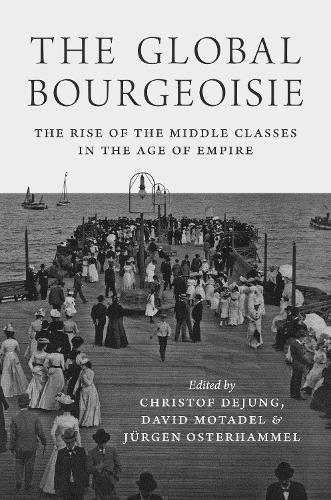
The Global Bourgeoisie: The Rise of the Middle Classes in the Age of Empire
(Paperback)
Available Formats
Publishing Details
The Global Bourgeoisie: The Rise of the Middle Classes in the Age of Empire
By (Author) Christof Dejung
By (author) David Motadel
By (author) Jrgen Osterhammel
Princeton University Press
Princeton University Press
3rd February 2020
United States
Classifications
Tertiary Education
Non Fiction
History and Archaeology
Economic history
Social classes
305.55
Physical Properties
Paperback
400
Width 155mm, Height 235mm
Description
The first global history of the middle class While the nineteenth century has been described as the golden age of the European bourgeoisie, the emergence of the middle class and bourgeois culture was by no means exclusive to Europe. The Global Bourgeoisie explores the rise of the middle classes around the world during the age of empire. Bringin
Reviews
"This well-conceived work is a must-read for students interested in the global history of the bourgeoisie and its relationship with the emergence of modern capitalism worldwide."---Giampaolo Conte, Journal of European Economic History
"This is a very important book that makes abundantly clear that the emergence of the middle class and bourgeois culture in the nineteenth century was by no means exclusive to Europe or even necessarily emanated from Europe."---Jeffrey Auerbach, World History Connected
"The impressive breadth of the chapters is matched by a sense of analytical depth stressing the connections among global bourgeois elites and comparisons of the characteristics, behaviors, and visions that cut across national cases. . . . Reading The Global Bourgeoisie affirms the view that global history as a subfield has matured remarkably over the last three decades."---J. Laurence Hare, International Social Science Review
"One of the major intellectual projects in central European history during the last two decades of the 20th century was the study of the Brgertum. . . . Since that time, global historyglobal in expanding the comparative perspective outside the wealthier countries of the North Atlantic, but also in placing world-wide interactions at the center of historical structures and developmentshas become steadily more influential. The current volume, a collection of essays based on a workshop held in Cambridge in 2015, is an attempt to take the Brgertum project global."---Jonathan Sperber, Francia Recensio
Author Bio
Christof Dejung is professor of modern history at the University of Bern. David Motadel is associate professor of international history at the London School of Economics and Political Science. Jrgen Osterhammel is professor emeritus of modern and contemporary history at the University of Konstanz.
